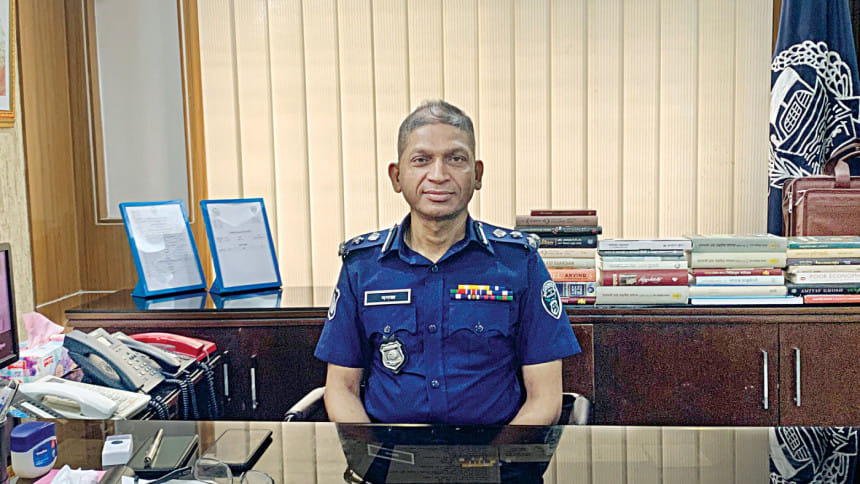‘We try to ensure no one is denied justice’

Formed in 2012, Police Bureau of Investigation (PBI) has earned a reputation for solving the seemingly unsolvable, "sensational" and difficult cases. This specialised unit conducts criminal investigations and digital forensic services by the order of court and Police Headquarters (PHQ). In an interview with The Daily Star, PBI chief, Deputy Inspector General (DIG) Banaj Kumar Majumder spoke about the organisation's work process, achievements, challenges, constraints and future plans.
The Daily Star (DS): How did PBI start its journey?
Banaj Kumar: The National Integrity Strategy formulated by the government referred for an independent investigation body to deal with cases. Besides, the demand for such a unit was also raised from the court, which eventually gave shape to PBI. Set up in 2012, PBI started investigating cases from 2015.
Generally, the Detective Branch (DB) and police stations investigate cases, which are part of district police. If anyone feels that justice has not been served, then they can apply for re-investigation by the Criminal Investigation Department.
Even after that, they may feel they did not get justice. So, keeping that in mind, the independent investigation body -- PBI -- was formed. We started with 900 personnel, which was later increased in 2017. Now, we have around 2,182 officials working in the unit.
DS: What are your major focuses and processes during an investigation? Is there any time-frame?
Banaj Kumar: PBI has the authority to take over investigation of cases related to murder, rape, robbery, arms and narcotics filed with different police stations. Besides, the court and Police Headquarters (PHQ) can handover any case to us, and a person can come to us for investigation through court.
Since 2016, we have received around 17,503 cases filed with police stations (GR) and 67,442 filed with court (CR) till date. Of the cases, PBI has already completed investigation of 14,247 GR cases and 61,431 CR cases.
For investigating cases, we mainly focus on two issues -- the truth behind the incident and documentation. We also keep an open eye so that the accused are not denied justice as well. For example, a person may have been present during a murder but did not take part in it. So, that person needs to be framed with appropriate charges.
In cases filed under the women and children repression act, we have to submit charge sheets within 180 working days. For other cases, like a sensational or gruesome murder, we even wait for years until we are able to manage all related documents for investigation.
For investigating a case, first we form a team with an investigation officer (IO). We then ask the IO to visit the crime scenes as many times as possible to gather evidence.
We have a saying in PBI -- listen to what the accused and complainant have to say carefully, and do not judge beforehand.
We are now trying to come out of the culture of taking verbal statements to probe cases, which is an old practice of police. We are trying to come up with an alternative to avoid recording statements under section 161 or 164.
DS: What special training PBI officials go through to handle cases, as some are either quite sensational or dates way back?
Banaj Kumar: We always try to teach IOs how to ask more questions regarding any incident. After solving every sensational or critical incident, we arrange a case study for our members.
Officials participating in the training session express their opinions regarding the case and ask the IO questions. The main reason behind it is to increase the ability of the IO to ask questions.
DS: PBI also handles militancy, cybercrimes, money laundering and trafficking cases. You have set up a specialised unit to run Counter Terrorism Unit. Can you elaborate on how it operates?
Banaj Kumar: After the 2016 attack at a Dhaka café, we realised that we may also need to operate in emergency situations. So, we needed to be prepared, as back then, militancy had no relations with our investigations.
Therefore, I asked officials to make create lists and details of militants who have been arrested since 2005 across the country. During the process, we got vital information regarding militancy and got to study the cases, which helped increase our knowledge.
For cybercrime related cases, we have a cyber laboratory, which we continue to update with the latest available technology. For example, we have recently asked PHQ for a technology that will help us identify a suspect by analysing camera footage, even if they are wearing a facemask. Due to the pandemic, at least 30 percent people may leave their masks on while moving outside. Criminals may take that opportunity, and we want to be prepared for it.
We have also taken steps to turn our unit into a woman-friendly investigation centre, so that female victims feel safe when they come for help.
DS: Some of the cases PBI handles are quite sensational and equally sensitive. Do PBI officials face obstacles or challenges while dealing with those, and how do they overcome that?
Banaj Kumar: While investigating old cases, we do face some challenges. Sufficient information and digital evidence are often not found in those cases, and people related to the cases at times do not remember clearly about the incident.
Sometimes, "pressure groups" try to influence the investigation. To overcome this, all officers of the unit have been directed to tell such groups to communicate with PBI's DIG.
When they communicate with me, I suggest them to meet the home minister or police chief for recommendation. Thankfully, I have never received any request from the ministry or PHQ in favour of these groups, so far.
DS: At the same time, some of the cases also implicate law enforcers. This issue can be quite sensitive. How do you handle it?
Banaj Kumar: An incident can take place while performing duty, but we do not spare any law enforcer for a crime. Although, the police chief has given consent to act against all those responsible and has a zero-tolerance policy in this regard, we consult with PHQ in such cases.
Besides, we always produce all the documents and evidence before the media, especially in cases where law enforcers have been accused.
DS: Following a court order, PBI is probing the case filed over torture of cartoonist Ahmed Kabir Kishore in police custody. Can you tell us about it?
Banaj Kumar: Yes, we are investigating the case and looking into all details. A medical board was formed to check his health. We have nothing more to disclose about the case yet.
DS: Do you have any internal vigilance?
Banaj Kumar: We always oversee our officials' activities and have a provision to take lawful action whenever anyone is found involved with unlawful activities. Around 20 officials have faced different types of punishment last year for their involvement with offences. Of them, a constable and an assistant sub-inspector were sacked from the force.
Besides, we always allow visitors in PBI offices and have issued a directive to all officers to listen to their problems patiently and cordially. We also observe how they communicate with visitors.
DS: What are some of the constraints and challenges PBI faces?
Banaj Kumar: We have manpower shortage in every district, and shortage of vehicles and equipment must also be addressed. The government has already allocated around 43 units of land, and funds to build infrastructure.
We need more infrastructure, as we want to continue training officials in every unit. Besides, we often conduct research to improve our investigation capability.
DS: With the methods and nature of crimes changing, and to some extent evolving, what are your future plans to cope with them?
Banaj Kumar: We also have to deal with the changing patterns of crimes. For example, if any crime takes place using technology, then it will be not possible to solve it, unless you know about the process completely. That is why we are working on improving our technological knowledge constantly.
Our focus is to improve not only in the digital sphere, but also in analogue processes. I often hear from IOs that they did not find cell-phone details of a person. I tell them to go their residence, speak to locals, and try to come up with other solutions rather than just giving up.
We are trying to improve our strength and capability centring crime scene investigation and have issued directives to officials to keep investigating. They do not need to solve cases right away or all the time, but they do need to prove that they have tried and given their best.


 For all latest news, follow The Daily Star's Google News channel.
For all latest news, follow The Daily Star's Google News channel. 



Comments